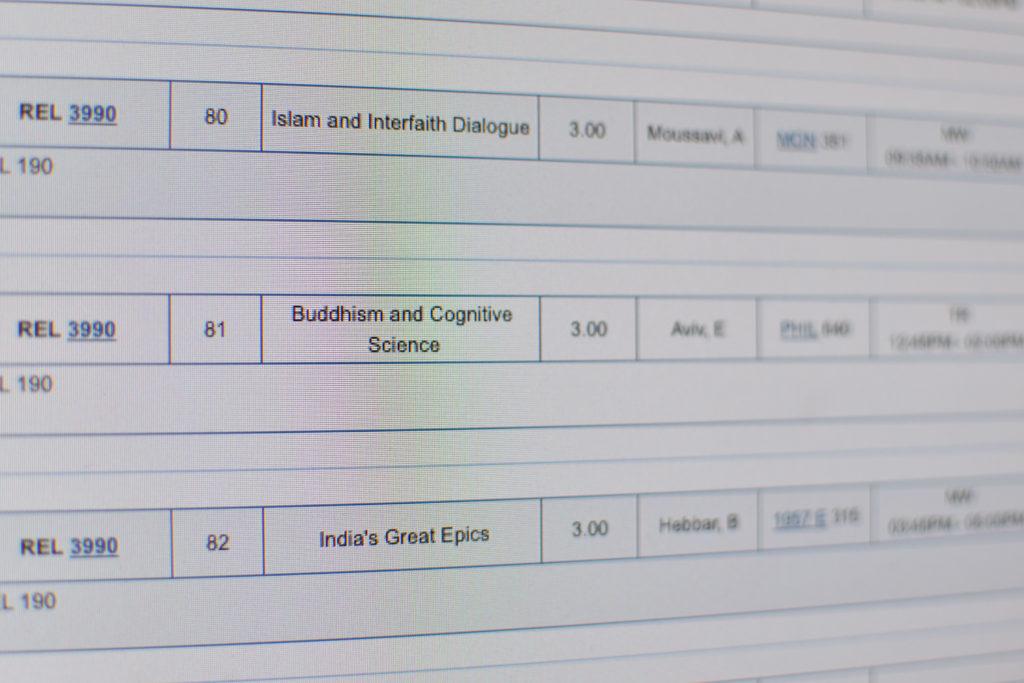Updated: Monday, Nov. 19 at 7:29 p.m.
As you roll out of bed for class registration this week, stay on the lookout for new courses to round out your schedule.
Several professors are introducing new classes – like The Postwar Jewish Experience and Buddhism and Cognitive Science – next semester and bringing back the class The Ghetto: History of a Concept, which has not been offered in more than two years. Professors said they are introducing or re-introducing these classes after conducting research on specific topics like the Holocaust and aging.
Here’s a look at new classes you can take next semester:
Buddhism and Cognitive Science
Associate professor of honors and religion and international affairs Eyal Aviv said he is teaching Buddhism and Cognitive Science for the first time in the spring. Aviv said the class will explore the intersection between cognitive science and Buddhist philosophy.
“I think that conversation between them is a wonderful way to take an interdisciplinary approach that seems to be more and more important for young scholars in the face of the kind of academia that we have evolved to be,” Aviv said in an email.
He said he wanted to offer the course after students approached him expressing interest in Buddhism and cognitive science. The class will look into the two paradigms separately, then dive into topics involving both fields – like attention, meditation and emotions, Aviv said.
“I know that students are interested in Buddhism, and I know that there is also growing interest in cognitive sciences at GW,” Aviv said. “I thought it to be a potentially good match.”
The course is offered to undergraduates and is capped at 10 students in the honors, philosophy or religious studies programs. Aviv said students do not need to take a prerequisite for the course.
The Postwar Jewish Experience
Jenna Weissman Joselit, a professor of Judiac studies and history, will teach The Postwar Jewish Experience, which will cover the different ways the Jewish populations in Europe, the United States and Israel came to terms with the destruction caused by the Holocaust and learned to rebuild. The class is open to students in the history and honors programs.
Joselit said she wants the course to be used as a way to compare the tragedy with modern issues of anti-Semitism.
“Many of the phenomena the course confronts – masses of people on the move with nowhere to go, the presence of vast refugee camps administered by the American government and reconstruction on a grand scale – have their counterparts in the pressing problems we currently face,” Joselit said.
Joselit added that she does not want the course to be a lesson on the horrors of the past but a recognition on how society can move forward and progress.
“For all of its disheartening moments, the course is also a testament to the resilience of the human spirit,” she said.
Adult Development and Aging
Adult Development and Aging will be taught for the first time next semester by psychology department chair and associate professor of social psychology Carol Sigelman. The course focuses on psychological development and aging in adult years in an attempt to break the misconceptions people hold about aging, Sigelman said.
“I think it benefits everyone to have a richer understanding of issues facing people of different ages because we live and work with them every day,” she said in an email.
Sigelman taught a variation of the class back in 2014 but hopes to continue teaching it at least once a year after next semester.
She said the only prerequisite for the course is Psychology 1001, and the course is an elective that counts toward a psychology major. Sigelman said the class is a good fit for any student interested in sociology and human services, anthropology, speech and hearing, exercise science or public health.
“I think knowing about human development and aging helps us understand ourselves and other people and helps equip us for careers working with people,” Sigelman said. “I’m now old enough myself to have special expertise on aging.”
The Ghetto: History of a Concept
Director of the Judiac studies program and associate professor of history Daniel Schwartz is bringing back the course The Ghetto: History of a Concept after he published his book of the same title in September. He last taught the Judaic studies course in spring 2017 as part of his research for the book.
Schwartz said his course explores the word “ghetto” through its origin and evolution throughout history. The course looks at four case studies: the origin of the word through the original ghettos of late medieval and early modern Europe; the immigrant enclaves of the late 19th and early 20th centuries in major Western cities; the ghettos of the Holocaust; and the modern context of the word “ghetto” associated with African Americans.
There are no prerequisites to taking this course, and it is open to everyone. Schwartz said students interested in the history of segregation, medieval history, early modern history, immigration history, holocaust studies and African American studies may be interested in taking the course.
“I think one of the upshots of the course is that language is really a battlefield, and that so many of the pressing arguments that we have now happen to be arguments over words: what they mean, how they’re used, who gets to define them, and that’s a very much contemporary issue,” Schwartz said in an email.
This post was updated to correct the following:
A previous version of this story states that Eyal Aviv is trained in both cognitive science and Buddhist philosophy. He is only educated in Buddhist philosophy.







